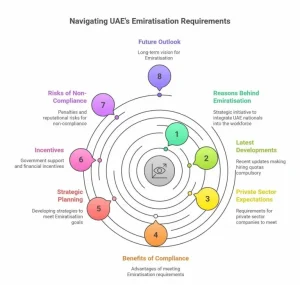Working with the emiratisation requirements that UAE has set forth can be quite complex. But you need to consider how it is a foundation for building a compliant and forward-thinking business.
UAE continues to empower its national workforce and create a sustainable economy. Business in the private sector here needs to meet these ever-changing regulations. Staying ahead of the curve can be difficult at times, but it’s no impossible feat. Not when you have expertise and well-planned strategies at your side. We would go as far as to say that understanding these requirements is non-negotiable.
In this article, we try to break down the emiratisation requirements UAE in a way that makes sense and sets your business up for success. We cover the following points.
- The reasons behind Emiratisation
- Latest developments that should have your full attention
- What can the private sector expect when it comes to Emiratisation?
- The upsides of meeting the requirements
- How to come up with a strategy that works in your favour?
- Incentives for the initiative
- Non-compliance: Is it worth the risk and price?
- What does the future hold in the grand scheme of things?
- Time to not only follow, but lead by example with Emiratisation Nafis
The Why Behind Emiratisation
Many seem to have taken Emiratisation as a buzzword. It’s a strategic initiative UAE’s government has taken. The aim? Integrating UAE nationals into the workforce. Companies are being encouraged to train and hire Emirati talent.
The government is working towards a future where national citizens are active contributors to the economy. This initiative not only benefits Emiratis. There’s something in it for businesses as well. Their talent pools are diversified, and change is welcomed with more open arms in workforces.
This can very well be considered a win-win situation here. Your company gets access to motivated and skilled employees. At the same time, you’re supporting the nation’s long-term vision. This is where UAE emiratisation requirements for private sector companies take center stage.
The Latest Updates You Can’t Ignore
We all know that UAE is committed to building a knowledge-based economy. That’s why new emiratisation requirements are being so frequently introduced. Recent updates have made meeting specific hiring quotas for Emirati employees compulsory for businesses in certain sectors. Non-compliance? That can result in penalties, increased fees, and reputational risks.
The government’s Nafis program plays a huge role here. It supports Emiratis in the private sector. They are offered training, job matching, and financial incentives. Companies that leverage programs like Nafis meet their compliance obligations. They also gain access to a growing pool of skilled professionals.

Emiratisation Requirements for the Private Sector
This is where we should get specific in our article. This is what you should know about UAE private sector emiratisation requirements.
- Mandatory Hiring Quotas: There are set quotas for hiring UAE nationals, taking your company’s size and industry into account. Companies that have 50 or more employees working for them need to make sure a percentage of their workforce is Emirati.
- Skill Development Initiatives: You can’t only hire and be done with it. There is an expectation for you to provide meaningful roles. It’s your responsibility to develop your Emirati employees’ skills. Structured training programs, mentorships, and career development plans — they are all part of the same equation.
- Compliance Deadlines: There are specific deadlines for meeting these quotas. Keeping up with the latest requirements and acting on time will save you from penalties.
- Reporting and Documentation: Businesses need to regularly report their compliance status. There are platforms for this designated by UAE’s government. Clear documentation and transparent processes are necessary for maintaining good standing.
Benefits of Meeting Emiratisation Requirements
Other than avoiding penalties, meeting the emiratisation requirements UAE opens up new avenues for your business’s growth. Your company will be able to gain a competitive edge, enjoy better government relations, and access exclusive incentives.
Checking the box is not all that there is to hiring Emirati talent. It’s about building a workforce that reflects the nation’s culture, ambition, and values. Emiratis bring their unique insights and perspectives to your company.
Building a Strategy That Works
Compliance doesn’t have to be stressful. With a well-thought-out strategy, meeting UAE emiratisation requirements for private sector businesses can be impactful.
This is how you can set your business up for success.
- Assess Your Current Workforce: Evaluate your current employee structure. Identify gaps where Emirati talent can be integrated and add value.
- Engage with Government Programs: Leverage initiatives and Nafis to access a pool of skilled Emiratis to benefit from government support.
- Create Meaningful Roles: Offer roles that match Emirati job seekers’ aspirations and contribute to their professional growth.
- Train and Retain: Invest in training programs to ensure your Emirati employees are equipped to excel in their roles. Retention is as important as recruitment.
Unlock Exclusive Incentives by Embracing Emiratisation
Meeting emiratisation requirements isn’t only about compliance. It’s your ticket to exclusive government-backed incentives. Businesses that actively engage with Emiratisation initiatives often enjoy substantial perks that go beyond the balance sheet.
For starters, companies that hit their Emiratisation targets can access reduced government fees and priority in public sector contracts. These benefits can significantly lower operational costs. They’ll position your business as a preferred partner for government projects.
Nafis offers financial support for companies and Emirati employees. Subsidized training costs, wage support, and recruitment assistance – these are only the tip of the iceberg.
Going the extra mile to invest in Emiratisation not only makes financial sense. Instead, it also strengthens your brand image. When your business is quite active in its support of national initiatives. It shows its commitment to the UAE’s vision. This builds trust with clients, partners, and the community. It, in turn, gives you a competitive edge.
The Cost of Falling Behind — Why Non-Compliance Isn’t an Option
Ignoring new emiratisation requirements could lead to more than fines. Businesses that don’t comply face reputational damage, higher government fees, and restrictions on obtaining necessary approvals.
Non-compliance signals a lack of working with UAE’s priorities. This, of course, can hurt your relationships with stakeholders. Clients and partners are increasingly choosing to work with companies that reflect their values — compliance, interestingly, being one of them.
Penalties for not meeting UAE private sector emiratisation requirements escalate quickly. Be it the severe financial sanctions or the disastrous loss of lost opportunities in public-sector projects, the consequences are immediate and long-lasting.
Integrating Emiratisation ensures you’re compliant. It also positions you for growth in a progressing market. Why take risks when the rewards for compliance are so compelling?
The Future of Emiratisation in the UAE
UAE is spearheading its way to economic development. In these times, the role of Emiratisation requirements is expected to grow. These policies, as we know, are not static. They will be going through constant changes to better reflect the country’s priorities and vision.
Keeping up means more than meeting quotas. Creating a culture that values diversity, inclusion, and continuous improvement — that’s what it entails. Businesses that embrace Emiratisation as an opportunity – instead of as a challenge – are the ones that will flourish in the long run.
Ready to Lead the Way?
On the surface level, meeting the emiratisation requirements UAE might seem akin to a regulatory checkbox. But in reality, it’s a chance for you to be part of a transformative movement. Align your business with these goals. This way, you’re not only securing compliance. You’re contributing to a brighter and more inclusive future for the UAE. Let’s make it happen together. Contact us for our services.
FAQs for Emiratisation requirements
How can businesses ensure Emiratisation compliance easily?
By working closely with the Nafis program and providing training to Emiratis. They need to ensure that eligible Emirati nationals have equitable job opportunities.
What are the fundamental Emiratisation prerequisites for businesses in the UAE?
To achieve requirements, businesses with at least 50 qualified workers must hire two percent or more Emirati workers each year.
What companies don’t need to comply with Emiratisation guidelines?
Most of the time, enterprises with fewer than fifty staff members, free zone firms, and certain government-owned businesses are not required to pay.
How can businesses keep track of their Emiratisation progress?
Companies use the official MOHRE online systems and platforms to report their accomplishments every six months.
What legal sanctions may apply for violation of the Emiratisation standards?
Companies that violate the rules have to pay a fine every year for each Emirati target they fail, and the cost gets higher every year.



